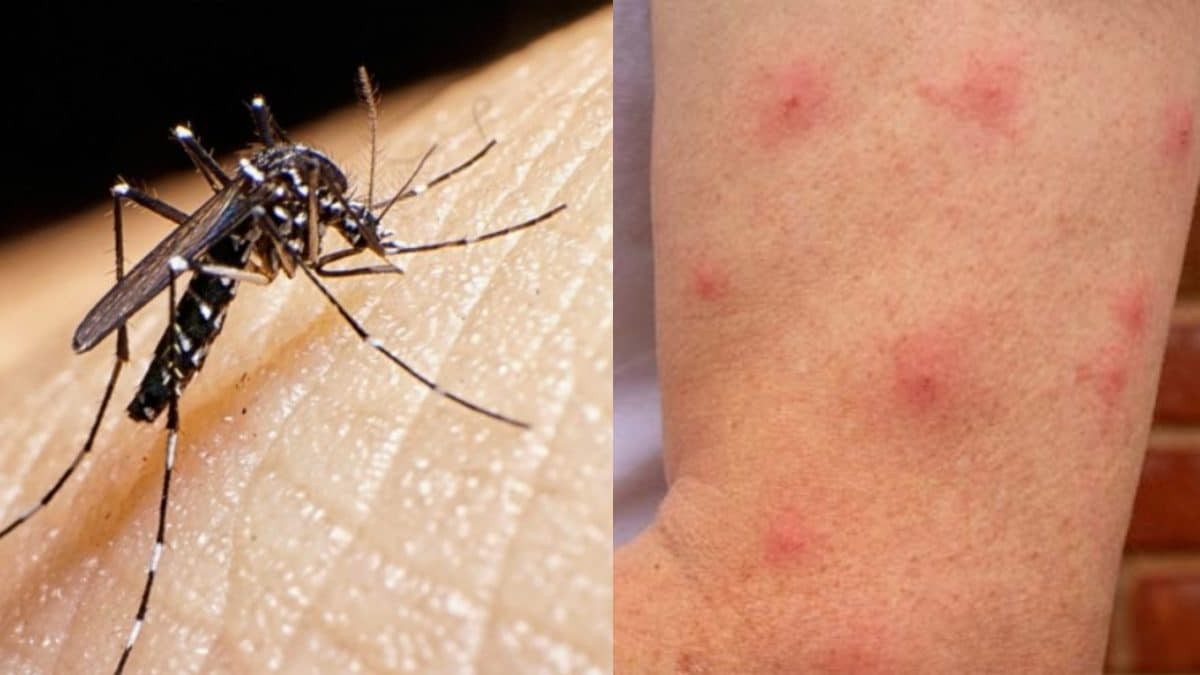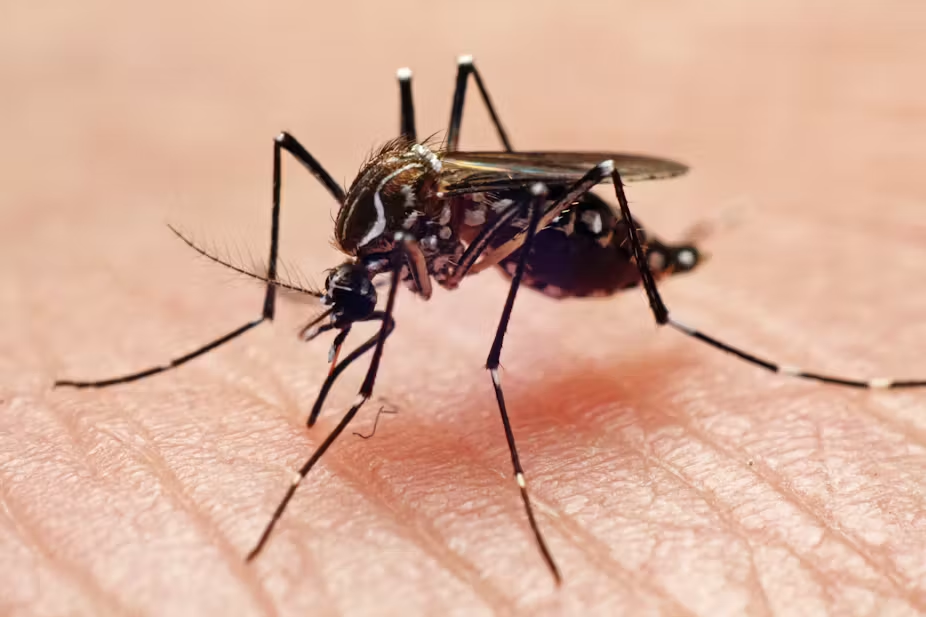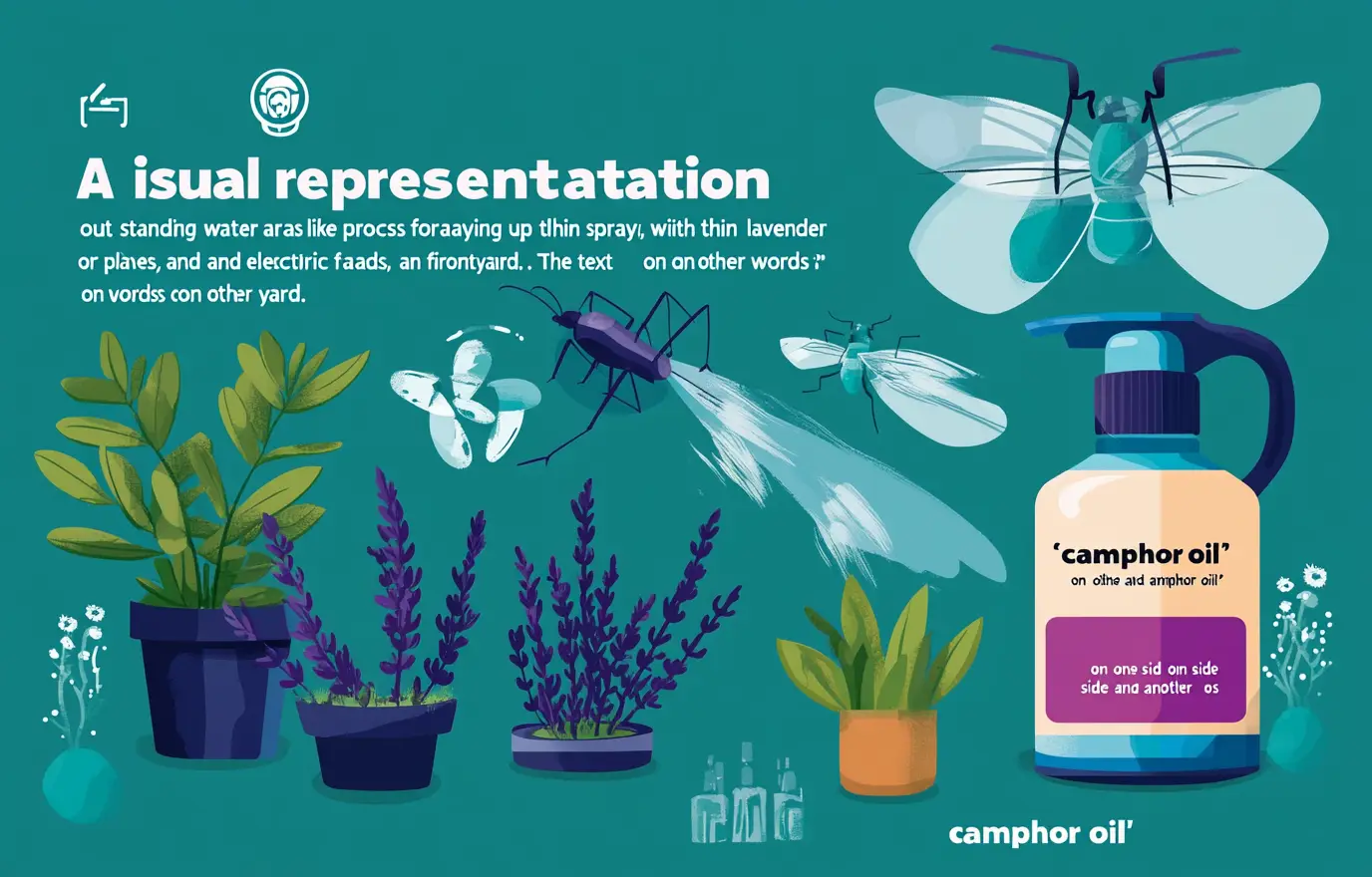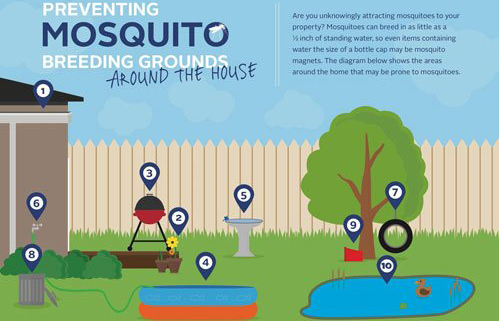Effective Ways to Keep Mosquitoes Away From Your Home

PHOTO: Cyprus Dermatology Clinic
Every person who enjoys a backyard has struggled with insects. It usually feels like someone ends up with those annoying bug bites at the end of the night regardless of the number of repellents you test. Although we cannot totally eradicate mosquitoes—after all, there are more than 3,500 species globally and more than 400 only in the United States—there are several strategies to reduce mosquito bites and stop these buzzing invaders from spoiling your next outdoor event. With the right mosquito repellent and a few simple strategies, you can keep those annoying bugs at bay and enjoy your time outside bite-free!
RELATED 1: Got Bitten? Here’s How to Identify and Treat 8 Common Bug Bites!
RELATED 2: How Doctors Recommend Stopping Bug Bites from Itching

PHOTO: The Conversation
Why & When Mosquitoes Bite
Though they seem to have a grudge against us, mosquitoes are not our major target either. "Many mosquitoes prefer animals like frogs, birds, and lizards," some experts says "but humans have evolved to be a more consistent blood source for these insects." One outstanding example of an invading bug that fits this profile is the aggressive and biting Asian tiger mosquito. Mosquitoes like this can thrive because they are clever and have few natural opponents.
Mosquitoes are essential to the ecosystem despite their nasty bites since they poll plants, feed other insects, and offer food for bats, fish, and birds. Only female mosquitoes bite as the sustenance in their eggs and larvae depends on blood.
Mosquitoes are most active in hot temperatures; the United States sees its peak mosquito season from June to September. Although most of these critters are most active in the morning and evening, certain species may bite all day. Dawn and sunset are therefore the ideal times to find them.

How to Outlaw Mosquitoes from Your Yard
Less expensive and simpler options to make your yard less mosquito-friendly than you would have thought exist here. If you want to avoid having mosquitoes overrun your outside space, use these easy and efficient methods:
1. Get Rid of Any Ponding Water
Although you have probably already received advise on emptying any standing water, it is still advised. Anything from a yogurt container to a saucer set under a plant can create the perfect hatching environment since mosquitoes can deposit their eggs in even the smallest of puddles. Look for any water pools anywhere in your yard, particularly in plants without holes cut into them or in the accordion pipes extending your gutters. Get rid of any standing water to help to keep mosquitoes away.
2. Keep an Eye on Recycling Containers
Mosquitoes particularly enjoy laying their eggs in containers like cans and bottles that gather rain. Drilling small holes in the bottoms can help to guarantee that water leaks out of cans kept outdoors.
3. Keep Gutters Clean On a regular basis
Mosquitoes find their perfect habitat in blocked gutters. Swimming in water heavy in fallen leaves and other detritus is rather appealing. Twice a year, ideally in late spring and fall, gutter cleaning will help to keep your gutters free of mosquitoes and clear. Gutter guards could be a wise purchase if one wants to stop more accumulation.
4. Planting Plants That Repel Mosquitoes
Nature has mosquito-repelling herbs available. Among the plants able to discourage these pests are catnip, rosemary, basil, lemon thyme, lemongrass, citronella grass, and lemongrass.
5. Keep Your Pool in Top Condition
Mosquitoes enjoy standing water, hence take great care around pools. Essential maintenance chores are routinely swimming pool cleaning and water circulation. Since chlorine kills mosquito larvae, maintaining the advised chemical levels in your pool will help to prevent mosquito colonies from growing.
6. Prepare a Spark Plug
Lighting a fire pit is a great way to enjoy a warm outdoor evening without being bitten by mosquitoes or any of the other bugs that hate smoke.
7. Clear out the Yard
Mosquitoes like to nest in water-collecting abandoned items include rusted patio furniture, old tires, or abandoned barbecues. Clearing your yard of clutter will help you to eliminate some potential mosquito havens and make the area less enticing to pests.
8. Construct a Tree Base
Examining your trees for any holes that might store water will help you eliminate insects. Expanding foam will help you to patch the holes without harming the tree. Steer clear of things like sand, gravel, or concrete if you want to guard the tree from damage and guarantee correct drainage.
9. Visit with Your Neighbors
As mosquitoes cannot indicate where one property boundary ends and another starts, it is imperative to involve your neighbors in the battle against them. Standing water or hatching areas in their yard raise your chance of mosquitoes invading your area. Engage a friendly conversation to make sure everyone in your area is contributing to keep mosquitoes away.
10. Contact Mosquito Control Programs in Your Area
Many counties have mosquito control programs that treat mosquito breeding sites—such as marshes and stagnant water. Should a significant mosquito outbreak arise in your area, contact the local authorities. Remember that changes in mosquito dispersal brought on by climate change could cause mosquito hotspots to alter over time.
RELATED: Don't Just Focus on the Yard—Pest Control in Your Basement is Equally Important

Mosquito Control for Your Yard
Although first avoidance of mosquito problems is ideal, occasionally you could go across them. Following these easy guidelines can help you eradicate mosquitoes from your yard if they have started to breed there:
RELATED: Top 6 Fly Traps for Effective Pest Control
Pray for Predators Existing in Nature
Regarding combat of mosquitoes, nature can be a helpful friend. Attracting bats, fish, and birds—all of which eat mosquitoes—helps one to control them. We must draw in these predators with:
- Birds: Set feeders and bird baths all over your yard to draw mosquitoes' eating birds.
- Fish often eat mosquito larvae, hence if you have a pond, you could wish to consider maintaining some goldfish or bluegills.
- By building a bat house in your yard, you could draw bats—which are quite good at repelling mosquitoes. One night a single bat might eat thousands of mosquitoes!
Apply Oil of Lemon Eucalyptus
Lemon eucalyptus oil works magic as a naturally occurring replacement for synthetic repellant. Studies (including one in the Journal of Insect Science) show that lemon eucalyptus oil's efficacy against insects is on par with DEET's; but, it does not have the same harmful chemical impact. It's great for people looking for a more natural substitute or individuals with sensitive skin.
Instal a Mosquito Cage
Although bug zappers are everywhere, a handmade mosquito trap might yield far better results. Set up your own by using these guidelines:
- Two different sized buckets, water, flypaper or sticky tape, grass, or yeast; canola oil.
- To create a mosquito trap, fill a bucket with water then top with grass or yeast.
- Coat the sides of the container in canola oil to draw mosquitoes.
- Hang flypaper inside to grab them in the middle of attempting to lay eggs in the bucket. Because it catches mosquitoes before they can lay eggs, this do-it-yourself trap is excellent for lowering mosquito populations.
Use Anti-mosquito spray.
One of the greatest choices to keep mosquitoes away is to apply DEET-containing repellent. DEET masks your smell, thereby making it more difficult for mosquitoes to find you rather than killing them. Although some people question DEET's safety, the CDC and EPA have both said that, used correctly, it poses no health hazards to most people, including children.
Get a Fan Out
One surprising way to keep mosquitoes at bay is to run a fan outside. A fan generates sufficient airflow to obstruct mosquitoes' capacity to fly, since they depend on calm air for navigation. The breeze will greatly reduce the likelihood of mosquito landings, although they can still occur under certain situations. To make it even more effective, place many fans around the outside of your outside area to generate a constant wind, which will keep the mosquitoes at bay.
A better overall protection and less mosquito presence during your outdoor gathering can be achieved by operating multiple fans around the party space in different directions.
Things That Are Ineffective in Repelling Mosquitoes
Unfortunately, not all mosquito control methods live up to their claims. Some popular approaches that fall short of expectations include these:
RELATED: Top 10 Pest Control Companies in the U.S.: Experts in Keeping Your Home Pest-Free
1. Candles with Citronella Aroma
Though often marketed to that purpose, studies show citronella candles are not very effective as a natural mosquito repellent. Research done in 2017 found that citronella candles have really poor efficacy in preventing mosquitoes. The nice aroma they give off isn't exactly effective in keeping insects at bay, either. You should look into more robust options if you're depending on citronella for protection.
2. Treatment for Mosquitoes
Yard mosquito treatment options are plentiful, but whether or not they actually work is debatable. There is little evidence that these treatments work, say the specialists. Though they target adult mosquitoes, larvicides are more effective against mosquito larvae than against adult mosquitoes.
Which mosquito repellent performs best?
Generally speaking, the best approach to prevent mosquitoes is DEET-containing therapy. Because of its reputation for masking human scent, DEET makes it more difficult for mosquitoes to find humans. On the other hand, lemon eucalyptus oil works wonderfully as a natural substitute. Evidence suggests it offers protection on par with DEET.
RELATED: Click Here to Discover Our Top-Rated Mosquito Repellents and Bug Sprays!
A healthy living or workspace isn’t just about cleanliness—it also involves addressing pest concerns effectively. While DIY methods may offer short-term fixes, professional pest control services provide targeted solutions and sustainable prevention. To help you manage pest issues efficiently, here are some highly regarded pest control companies that merge expert knowledge with environmentally friendly techniques for optimal outcomes.

